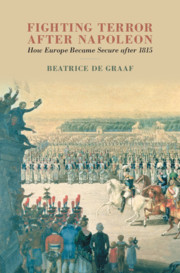Book contents
- Fighting Terror after Napoleon
- Fighting Terror after Napoleon
- Copyright page
- Contents
- Figures
- Maps
- Tables
- Acknowledgements
- Prologue
- 1 Introduction
- 2 Providence in Paris
- 3 Balancing in a Climate of Distress
- 4 ‘A Moderate Occupation’
- 5 Fausses nouvelles and ‘Blacklists’
- 6 Fighting terroristes Together
- 7 The Price of Security
- 8 Fortress Europe
- 9 Beyond Europe
- 10 Conclusion
- Bibliography
- Index
2 - Providence in Paris
Published online by Cambridge University Press: 12 September 2020
- Fighting Terror after Napoleon
- Fighting Terror after Napoleon
- Copyright page
- Contents
- Figures
- Maps
- Tables
- Acknowledgements
- Prologue
- 1 Introduction
- 2 Providence in Paris
- 3 Balancing in a Climate of Distress
- 4 ‘A Moderate Occupation’
- 5 Fausses nouvelles and ‘Blacklists’
- 6 Fighting terroristes Together
- 7 The Price of Security
- 8 Fortress Europe
- 9 Beyond Europe
- 10 Conclusion
- Bibliography
- Index
Summary
Towards the end of the war against Napoleon, the Allies declared that they were fighting a ‘noble war’, to restore European equilibrium. They presented themselves in stark contrast to Napoleon’s hegemonic ambitions. The Allies agreed on the need to create a ‘just equilibrium’ by curtailing French imperialism, but also harboured imperial ambitions to further their own respective interests in Europe as they negotiated for peace. When the First Treaty of Paris was signed on 30 May 1814, the French constitution was revised to be more liberal. The resulting Charte Constitutionelle, adopted on 4 June 1814, was an important instrument in the fight against terror. Finally, the Congress of Vienna was marked by Napoleon’s return to France: as he marched towards Paris, the Allies confirmed the statutes and treaties that would shape the occupation of France and ensure the ‘safety of Europe’. The final battle against Napoleon saw the Duke of Wellington at the helm of the alliance. The Allied sense of communality and solidarity in the name of Europe’s safety would see Napoleon defeated, but it would also invite tensions and inconsistencies in times of peace and the Allied occupation of France.
Keywords
- Type
- Chapter
- Information
- Fighting Terror after NapoleonHow Europe Became Secure after 1815, pp. 38 - 92Publisher: Cambridge University PressPrint publication year: 2020

